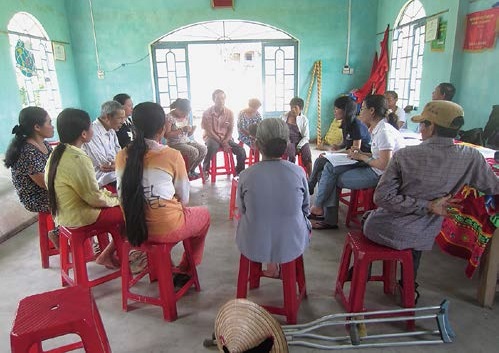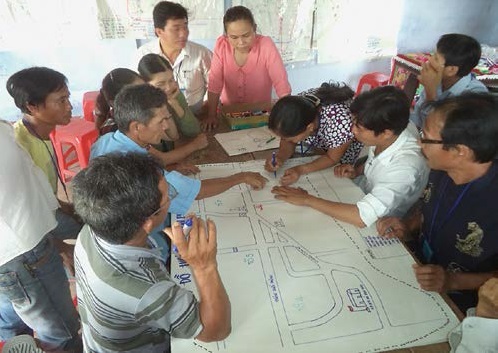Top Page > Grantee > List of Grantee in 2014 > Detail
Failures of development project, a case study of Song Tranh 2 Hydropower Plant in Quang Nam Province, Vietnam.

Discussion in Bac Tra My

Mapping the area affected by land mine
Research Background
Science is uncertain which is opposite to the mindset of technocrats. Song Tranh 2 Hydropower plant in Bac Tra My district, Quang Nam province in the Center of Vietnam, funded by ADB is threatening lives of thousands people living downstream of the river where the plant is built. Earth quakes have happened so frequently when the plant construction completed in 2012 and hundred housed of local people has been broken. They are living in worry that big scale earth quakes will happen, the reservoir will be broken and threatens their lives. In addition to that, when the plant is built, more than 1000 Cadong ethnic minority households in the district had to move the resettlement places where they received a concrete houses built by investor. Cadong people never live and like concrete houses but wooden-stilt house, it is their tradition and culture. In addition, recent earth quakes have broken the concrete houses so they don't live in these housed now.
This research will employ observation, focus group discussion and key informant interview with affected residents, local leaders to document their worries that the plant is threatening. How they feel to live with the concrete houses. In addition to these, information relating to participation of local residents, leaders into the EIA if this plant will be collected to analyze why as such issues happened and then the gaps in EIA identified and solutions proposed.
Findings of this research will be shared in 2 workshops with participation of local people, leaders, and decision makers and shared interest NGOs and share with donors the voice of affected people that they never reach. Recommendations on how to mainstream local people, their culture and tradition regard into EIA process will be advocated to mitigate similar failures of future development projects and make sure development benefits all.
[Oct. 2013]
Final Report (abstract)
The study finds that, to some extent, the Law on Environmental Protection in Vietnam has gradually improved and advanced to provide a better legal framework to protect alarming environmental threats resulting from over-exploitation of natural resources for economic development as well as consider social and cultural values of local communities affected by development project. However, this advanced legal framework alone does not necessarily translate into a better implementation. This is the result of lacking clear guidance (Decree, Circular, guidelines) on how to implement laws and lacking a mechanism to monitor legal framework enforcement, lacking of political will to protect the environment and affected communities. Poor governance is a common issue. Especially, participation of citizens in environmental management is at low level and an effective mechanism to facilitate multi-stakeholder processes is absent. In addition to these issues, the centralized system which is embedded in all aspects of management is the major factor that excludes local authorities from participation in making decisions that might impact local people. In the context of increasing demand for power and economic development as such centralized system, promoting governance in environmental management which improving participation of local communities and authorities in decision making process promises an alternative. It helps to minimize negative impacts resulted from development projects on local communities while science is uncertainty.
From above findings, some below recommendations are proposed to improve participation of local communities, civil society and financing institutions to ensure EIA is an effective tool to predict, measure and mitigate negative impacts of a development project to local communities and environment.
1.The law should be revised to stipulate clearly the procedure for participation of local people, local authorities from commune to province level to participate in EIA consultation as a compulsory process without condition.
2.Representatives of local people should not be governmental officers as they are influenced by political system so they voice out to protect local communities’ interests. So their representatives should be representatives from Civil Society Organizations who take side with the poor and marginalized groups.
3.The report of EIA should be publicized for those who are interested in to contribute counter-arguments to make sure that all aspects of the EIA appraised.
4.Government should encourage, establish and provide a legal framework to support and protect operation of independent institutes. In the context of Vietnam, creating independent institutes is the best way to utilize knowledge of experts. Normally, when they work for government, they don’t have a chance to contribute their knowledge and expertise freely because they are influenced by political system.
5.Law should be revised to clearly stipulate responsibilities of EIA evaluator and Approval Councils. This will help to improve their accountabilities and responsibilities.
6.Multi-stakeholder processes should be promoted and mainstreamed through all the steps of the decision-making process, from local to central levels to make sure that all stakeholders can participate equally and together reach a consensus.
7.Last but not least, in the context of economic and political characteristic in Vietnam, monitoring role of financing institutions such as the World Bank, Asia Development Bank, JICA play a crucial factor to ensure the government fully implement their livelihood restoration plan, resettlement plans attached to loan documents. In fact, implementation of livelihoods restoration plans, environmental and cultural protection plans is costly for government. In the context of lack of resource for fully implementation of these plans from Government, it is a common practice in developing countries that these plans have developed but they don’t implement them as budget constraints. Acknowledge that The World Bank and Asia Development Bank have quite comprehensive requirements related to resettlements, livelihood restoration, environmental protection that borrowers have to follow. However, these finance institutions don’t have adequate resource, consultants to help them to monitor if the borrowers implement what they committed.
[Jan. 2015]
Others






